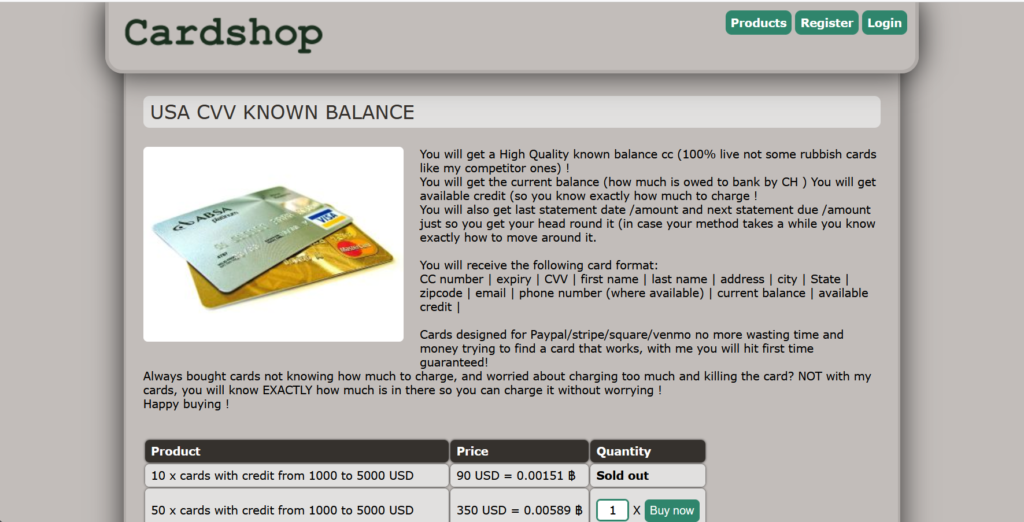Table of Contents
ToggleCardshop – TOR Scam Report (4)
Onion Link: http://f6wqhy6ii7metm45m4mg6yg76yytik5kxe6h7sestyvm6gnlcw3n4qad.onion
Scam Report Date: 2024/01/02
Client Scam Report Breakdown
Original Report Summary:
The client report details a transaction made on a website that offers illicit products, including credit card information with known balances, under the guise of “USA CVV Known Balance” and “Worldwide CC & CVV.” The client states, “I ordered something from this site and I still haven’t received my products after 1 week.” The complaint reflects a typical scam scenario where a buyer, lured by the promise of illegal services, is ultimately defrauded. The website in question offers various packages of credit card information at different price points, with the promise that these details will be usable for unauthorized transactions. The client likely made a payment through this site expecting to receive stolen credit card information but has since been left empty-handed.
Terminology and Definitions
Understanding the terms used in the scam is crucial to grasp the severity and nature of the fraud. “CVV” stands for Card Verification Value, a security feature for credit card transactions, typically a three- or four-digit number printed on the card. “BIN” refers to the Bank Identification Number, the first six digits of a credit card number that identify the issuing bank. “AVS” or Address Verification System is a security measure used to verify the address of a person claiming to own a credit card. In the report, terms like “non-AVS” and “non-verified by Visa” indicate cards that bypass these security checks, making them more vulnerable to fraudulent use. The products are sold in packages with various amounts of credit, promising buyers they can conduct illegal transactions with ease. The scam here involves the site taking payment for these illicit products but failing to deliver, leaving the client with nothing.
Analysis and Implications
The scam outlined in the client’s report is a clear example of a “bait-and-switch” scheme, where the buyer is promised illegal goods that are never delivered. This scenario underscores the risks associated with engaging in illegal activities online, where the buyer has no legal recourse when defrauded. The site exploits the buyer’s criminal intent, offering seemingly irresistible deals on stolen credit card information. However, the real intention of the scammers is to collect payments without delivering any goods or services. The scam is particularly pernicious because it preys on individuals seeking to commit fraud themselves, effectively making them victims of a more sophisticated fraud. This report should serve as a warning to others about the dangers of engaging with illegal online marketplaces, highlighting the ease with which criminals can scam those who seek to commit crimes.







